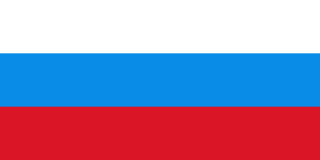
The modern history of Russia began with the Russian Republic of the Soviet Union gaining more political and economical autonomy amidst the imminent dissolution of the USSR during 1988–1991, proclaiming its sovereignty inside the Union in June 1990, and electing its first President Boris Yeltsin a year later. The Russian SFSR was the largest republic of the Soviet Union, but it had no significant independence before, being the only Soviet republic to not have its own branch of the Communist Party.
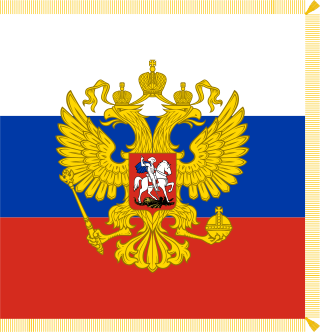
The president of the Russian Federation is the executive head of state of Russia. The president is the chair of the Federal State Council and the supreme commander-in-chief of the Russian Armed Forces. It is the highest office in Russia.

Boris Abramovich Berezovsky, also known as Platon Elenin, was a Russian business oligarch, government official, engineer and mathematician and a member of the Russian Academy of Sciences. He had the federal state civilian service rank of 1st class Active State Councillor of the Russian Federation.
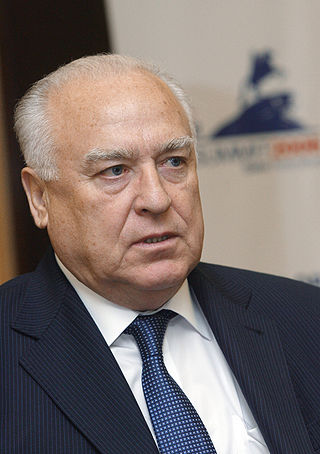
Viktor Stepanovich Chernomyrdin was a Soviet and Russian politician and businessman. He was the Minister of Gas Industry of the Soviet Union, after which he became first chairman of Gazprom energy company and the second-longest-serving Prime Minister of Russia (1992–1998) based on consecutive years. He was a key figure in Russian politics in the 1990s and a participant in the transition from a planned to a market economy. From 2001 to 2009, he was Russia's ambassador to Ukraine. After that, he was designated as a presidential adviser.
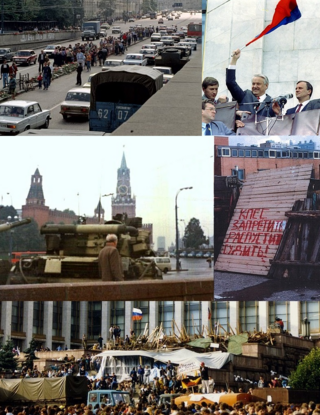
The 1991 Soviet coup d'état attempt, also known as the August Coup, was a failed attempt by hardliners of the Communist Party of the Soviet Union (CPSU) to forcibly seize control of the country from Mikhail Gorbachev, who was Soviet President and General Secretary of the CPSU at the time. The coup leaders consisted of top military and civilian officials, including Vice President Gennady Yanayev, who together formed the State Committee on the State of Emergency (GKChP). They opposed Gorbachev's reform program, were angry at the loss of control over Eastern European states and fearful of the New Union Treaty, which was on the verge of being signed by the Soviet Union (USSR). The treaty was to decentralize much of the central Soviet government's power and distribute it among its fifteen republics; Yeltsin's demand for more autonomy to the republics opened a window for the plotters to organize the coup.

Yury Mikhailovich Luzhkov was a Russian politician who served as mayor of Moscow from 1992 to 2010. Before the election of Gavriil Popov as the first mayor of Moscow, he also headed the capital in 1990-1991 as chairman of the Mosgorispolkom. He was the vice-chairman and one of the founders of the ruling United Russia party. During Luzhkov's time, Moscow's economy expanded and he presided over large construction projects in the city, including the building of a new financial district. At the same time, he was accused of corruption, bulldozing historic buildings, and poor handling of traffic, as well as the city's smog crisis during the 2010 Russian wildfires. On 28 September 2010, Luzhkov was fired from his post by a decree issued by then-President Dmitry Medvedev.

Presidential elections were held in Russia on 16 June 1996, with a second round being held on 3 July 1996. It resulted in a victory for the incumbent Russian president Boris Yeltsin, who ran as an independent politician. Yeltsin defeated the Communist Party of the Russian Federation challenger Gennady Zyuganov in the second round, receiving 54.4% of the vote. Yeltsin's second inauguration ceremony took place on 9 August 1996.

Boris Yefimovich Nemtsov was a Russian physicist, liberal politician, and outspoken critic of Vladimir Putin. Early in his political career, he was involved in the introduction of reforms into the Russian post-Soviet economy. In the 1990s under President Boris Yeltsin, he was the first governor of the Nizhny Novgorod Oblast (1991–1997). Later he worked in the government of Russia as Minister of Fuel and Energy (1997), Vice Premier of Russia and Security Council member from 1997 to 1998. In 1998, he founded the Young Russia movement. In 1998, he co-founded the coalition group Right Cause and in 1999, he co-formed Union of Right Forces, an electoral bloc and subsequently a political party. Nemtsov was also a member of the Congress of People's Deputies (1990), Federation Council (1993–97) and State Duma (1999–2003).
Semibankirschina, or seven bankers, was a group of seven powerful Russian business oligarchs who played an important role in the political and economical life of Russia between 1996 and 2000. In spite of internal conflicts, the group worked together in order to re-elect President Boris Yeltsin in 1996, and thereafter to successfully manipulate him and his political environment from behind the scenes.
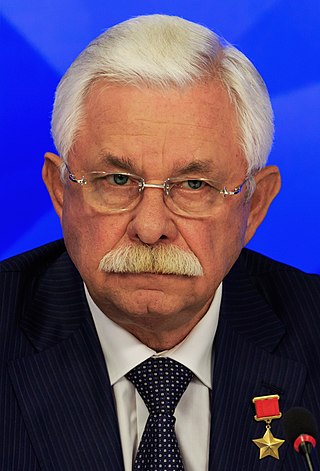
Alexander Vladimirovich Rutskoy is a Russian politician and former Soviet military officer who served as the only vice president of Russia from 1991 to 1993. He was proclaimed acting president following Boris Yeltsin's impeachment during the 1993 Russian constitutional crisis, in which he played a key role.

Boris Nikolayevich Yeltsin was a Soviet and Russian politician who served as President of Russia from 1991 to 1999. He was a member of the Communist Party of the Soviet Union from 1961 to 1990. He later stood as a political independent, during which time he was viewed as being ideologically aligned with liberalism.

Ural Federal University, named after the first President of Russia, B. N. Yeltsin, is an educational institution in the Ural region of Russia. The Ural Federal University was formed by a merger of the Ural State Technical University and Ural State University. It is one of 10 Russian Federal Universities. The university cooperates with the Russian Academy of Sciences and serves as a research and innovation center for the Ural region. UrFU offers educational programs in four areas of knowledge and 108 academic majors.

The presidency of Boris Yeltsin began with his first inauguration on 10 July 1991, and ended on 31 December 1999 when he announced his resignation. A referendum held on 17 March 1991 approved the creation of the post of president of Russia; Yeltsin was elected Russia's first president in a presidential election held on 12 June 1991.

Boris Yeltsin Presidential Center, also known simply as the Yeltsin Center, is a social, cultural and educational center, which opened in Yekaterinburg in 2015. The architect of the project is Boris Bernaskoni, the founder of BERNASKONI interdisciplinary bureau that works on intersection of architecture, communication, art and industrial design.

The first inauguration of Boris Yeltsin as president of the Russian Soviet Federative Socialist Republic (RSFSR) took place on Wednesday, 10 July 1991. The ceremony was held at the State Kremlin Palace and it lasted about thirty minutes. It was the first presidential inauguration ceremony in the history of Russia.
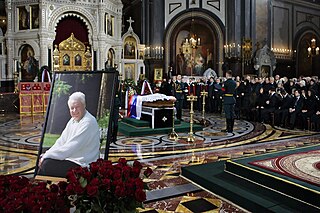
Boris Yeltsin, the first President of Russia, died of cardiac arrest on 23 April 2007, twelve days after being admitted to the Central Clinical Hospital in Moscow. Yeltsin was the first Russian head of state to be buried in a church ceremony since Emperor Alexander III, 113 years prior.

Cabinet of Boris Yeltsin and Yegor Gaidar was Russian Cabinet of Ministers under the leadership of President Boris Yeltsin and First Deputy Prime Minister Yegor Gaidar, which was in office from 6 November 1991 to 23 December 1992.
The New Year Address by the President of Russia is a traditional speech given in Russia by the President to the citizens, and generally broadcast on Russian television.

The Boris Yeltsin presidential campaign, 1996 was the reelection campaign of Russian President Boris Yeltsin in the 1996 election.

Kyrgyz-Russian Slavic University named after Boris Yeltsin is a university which is jointly operated by the Kyrgyz government and the Government of Russia, located in city of Bishkek, the capital of the Kyrgyzstan.















